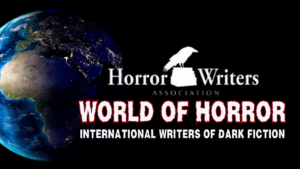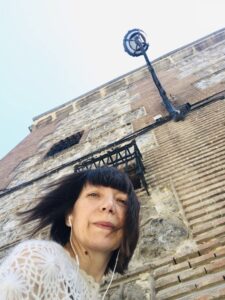World of Horror: Interview with Rosemary Thorne


Rosemary Thorne (she/her) is a bilingual Spanish writer, researcher, and translator living in Madrid, Spain. Born in 1968, she became an HWA member in 2019, choosing English as the most welcoming language for her horror fiction. Her first novel, El Pacto de las 12 uvas, was published in December 2021. She has also translated Edward Lee’s The Bighead into Spanish for Dimensiones Ocultas Press. Her goal for the years to come is to populate the English market with her dreadful monsters.
Find out more at: https://linktr.ee/Rosemary_thorne and Twitter at https://twitter.com/rosemarythorne_
What was it about the horror genre that drew you to it?
Horror has always been a natural environment for me. When I was a child, my home was hell, as my mother was extremely aggressive. I’ve told some anecdotes in other interviews, and I’ve also shared some details in short stories. This time I choose one related to horror movies. I was not allowed to watch them, but I would get out of bed and see bits of them hidden behind the living room door. Could it be “The exorcist”, “The omen”? I don’t remember. I just know that I gathered the knowledge that an upside-down crucifix would scare people very much, they would “stop” them, “freeze” them in terror. My small brain took it as an efficient sign of imminent danger, before which urgent reflection was called forth. We had a crucifix, a souvenir from El Valle de los Caídos, (The Valley of the Fallen, linked to Franco’s victory in the Spanish Civil War) I put the crucifix upside down truly believing that my mother would stop and freeze, she would be so frightened that it would change her forever. I was not possessed, of course. I was just executing the pure and tender logic of a child. Unfortunately, it didn’t work. I am amazed by the fact that at a very early age I was already experimenting with the grammar of horror and evil.
Is there a horror tradition in your country, in your culture? A taste for horror, a market? Not necessarily literature; perhaps oral tradition too.
Yes, there is a horror tradition, despite the deep-rooted Catholicism that endures in Spain. 19th-century poet & writer Gustavo Adolfo Bécquer could be our Edgar Allan Poe, but he is really out of trend, poor devil. Rather than in literature, horror showed up in paintings: I am thinking of Goya, who developed mind-blowing canvases and prints. His black paintings were on the walls of his house. He portrayed a dark side of our race (or rather races of the Iberian Peninsula). I’d say that our most authentic expression of horror during Franco’s dictatorship consisted in what was reported in “El Caso”, a newspaper that reflected what is called “La España negra,” (“The black Spain”) “El Caso” stories were like our “Deliverance” and “The hills have eyes.” There is something very dark in the mind of the Spanish people: Catholic beliefs would not allow it to unfold and take shape. Thus, we import horror from the States, which is much more convenient.
Who are some of your favorite characters in horror, internationally and/or in your own culture?
Witches are intriguing, and I keep researching them because the records have always been manipulated to meet different purposes at different times in history. I include male witches in my research: I don’t approach the matter from a gender point of view, just in case I miss something relevant pertaining to the practice. Either way, when we study monsters or abnormalities of the past, we have to stop thinking with a contemporary mind. Lose electricity, to begin with. Then, get close to forests and spend several winters in isolation. Kill your food. Have a bad harvest. Bury your own dead. Then resume researching monsters & abnormalities of the past.
Do you make a conscious effort to include characters and settings from your country in your writing and if so, what do you want to portray?
I do make the effort, and the English market doesn’t like it, generally speaking. To give you an example, I have a 1990 copy of one of Amos Tutuola’s novels published by Editorial Siruela, “My life in the bush of ghosts.” In the prologue, a British professor explains the need to implement edits to Tutuola’s English original text. My point is, why the need? I think it’s the wrong need. I feel the same with my characters and my stories. Why do I have to edit them to meet a standardized taste in the English horror market? At the risk of sounding blunt, this is one of my stands. I purposely limit the edits of my English short stories in order to convey an essence of Spanish horror, an essence of my unique mind. From time to time I meet editors and hosts who appreciated just that, and it fills my heart with joy and gratitude.
If you are not a native English speaker, but write in English, do you first think of horror in your native language or English? How do you draft them in your mind, in English or your mother tongue?
Thinking in one language or the other changes “everything.” I dare more in English, I follow thoughts to gruesome caverns and asphyxiating depths because I know I have more potential readers, (which is not true, really, because of what I have already explained above) I’ve also reached peaks in Spanish, and after writing certain scenes, I suffered terrible anxiety attacks because I was breaking taboos and “committing” blasphemy. Catholicism is so very deep-rooted in our minds that I think we unconsciously discard thoughts and miss the opportunity to create new archetypes, new dimensions of horror, out of some kind of organic terror. It is as if approaching a certain level of inner freedom would annihilate us, and would cause some kind of maddening inner implosion.
What has writing horror taught you about the world and yourself?
In many cultures, horror is used to overcome fears and reach levels of maturity. Many initiation rites worldwide use horror to put the individual on another level in life, other levels of perception, other dimensions, perhaps. It’s an essential element of the hero’s journey, the main trigger. At least, it is in my case! I am “in a conversation with” horror since I am four years old. It has ended up being something spiritual.
How have you seen the horror genre change over the years? And how do you think it will continue to evolve, both in the US and in your country?
There has been a generational replacement, as I think it happened in the rest of the world, with a new set of writers and readers, and some engaging proposals with a unique voice. US horror literature is also more open to South American myths, along with other horror traditions. I had access to it in the original languages, Spanish, Portuguese, and French. The same with other horror lore, African, Asian, Indian… I’ve always kept my eyes open for new paradigms in horror. Nowadays, I liked very much what the movie “Skinamarink” does to the mind and to the senses. It provides a language worth exploring. As an artist and researcher, I observe the genre in all its formats.
How do you feel the International horror writing community has been represented thus far in the market and what hopes do you have for representation going forward?
Huge economic interests are seriously affecting stories and writers. The market works well for US authors because the percentage of local readers has always been high, and in global terms, they export everywhere without difficulty. From time to time a non-US writer is suddenly launched to the skies and immediately backed up by a network supported by a lot of money. I’ve seen it happen several times, and I felt very frustrated because I lack means, I lack that kind of resources. (“Frustrated” doesn’t mean envious: everyone has their own fate) To not lose heart as a small lonely fish in the middle of an immense ocean, I decided to focus elsewhere: all non-commercial horror has my undivided and unconditional attention, especially if their marketing strategy is not orchestrated by anybody and they suck at social media interaction.
Who are some international horror authors you would recommend?
Yi Izzy Yu amazes me. For instance, her translation of “The shadow book of Ji Yun” is one of my bedtable amulets. I first read it as an ebook, and felt very happy when I finally could afford to purchase the physical book, which I immediately turned into an amulet. (By the way, importing books from abroad, even if they are from Amazon, is very expensive: a $20 book may arrive in Madrid costing $60) I love how Yi Izzy mixes horror with a feeling of wonder in all her writings. Nuzo Onoh does something similar in her stories. It happens when something dreadful stands so fiercely as a threshold to other realities that fear is overthrown by a paralyzing sense of awe. Onoh’s writing is terrifying and powerful: it touches a part of the soul that is common to all human beings. All within the cultural context of her Biafran-Nigerian origins too, which is fascinating to discover.
What is one piece of advice you would give horror authors today?
I am no one to give advice. I don’t really have a literary career, it’s very irregular and accidental. My resume is an abomination. I have always lived the act of writing as a passion, and horror as my mother tongue. I have the feeling that I was never given the opportunity of being anything else but what I am. As stated above, I believe everyone has their own fate.
And to the writers from your country out there who are just getting started, what advice would you give them?
Please, join the HWA this very instant! Let’s have a chapter in Spain to compete worldwide. Let’s have fun and make history! Click here! https://horror.org/join-now-choose-the-appropriate-category/
I can’t conclude this interview without sincerely thanking John Edward Lawson, HWA president, and Meghan Arcuri-Moran, HWA vice-president, for all the hours of hard work and thought they put into this organization. Thank you, Sumiko Saulson, for your commitment. And thanks Carol Gyzander and Shawnna Deresch, ex-sisters in arms, for your patience with me. Thanks to all HWA volunteers & Halloween people: you are the veins through which this association breathes and it is alive, it’s alive! You are my family indeed.




How fascinating! I’ve nothing I can really compare to the history of Catholicism in your part of the world, but I still feel Christianity as this vast and permeating presence. I don’t wish to come across as flippant, but do you have an opinion on de la Inglesia’s *30 Monedas*? I enjoyed the first season a great deal.